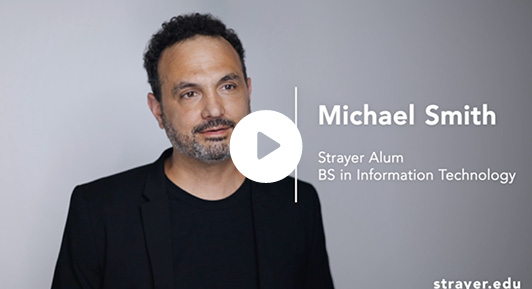Winter Classes Start January 5
How much will you save at Strayer?

Our financial aid experts can help you discover all the ways you can lower the cost of your degree, including:
- Federal Financial Aid
- Scholarships
- State Grant Programs
- Employer Tuition Reimbursement
- Private Loans
Depending on your experience, military status, transfer credits, and our innovative programs, you may be closer to your degree than you imagined.
Money-Saving Scholarships
Discover an education like you’ve never known—one that’s affordable. At Strayer University, we help remove financial barriers standing between you and your degree with money-saving ways to reduce your tuition.
Student Eligibility Criteria
Scholarship Description: New and readmit students entering a master’s program (minus JWMI) are eligible for a $3,000 scholarship, disbursing in a student’s third, fourth, and fifth quarters. A scholarship for the Jack Welch MBA program is offered through the John F. Welch Scholarship.
Eligibility Requirements:
- Must be a new or readmit student registering in spring 2024 term for any eligible Strayer University graduate program. This scholarship does not include Degrees@work, or Verizon Onsite. In all cases, the scholarship is at Stayer’s discretion.
- Student, any immediate family member of the student, or household member of the student may not be currently employed by the university, the university’s parent company, or any other subsidiary of the parent company.
- Student must complete a course in the spring 2024 term.
- Student must meet all Strayer University admissions requirements by program.
- This scholarship may be combined with the 2020 Referral Scholarship, but cannot be combined with any other scholarships/tuition discounts.
- Scholarship will be applied to the student’s account in three equal disbursements of $1,000 during the students third, fourth, and fifth quarters after starting their coursework in the program. If a student does not complete a course during a quarter where the scholarship is disbursed, the student forfeits that disbursement.
- No refund will be issued on unused scholarship amounts.
- Student must maintain good academic standing (GPA 3.0 or greater). In any quarter following the quarter where a student fails to maintain good academic standing, disbursements will be forfeited until the student returns to good academic standing.
- Scholarship applies to course tuition only. All other books and fees must be paid with a separate method of payment.
- For students whose tuition is billed to an employer or sponsor, the scholarship is applied first to tuition charges and then the sponsor is billed the net tuition amount (to the extent tuition benefits are available).
Working for the President, Kathryn Medina Made Her Success Possible

The passion for success came from Kathryn Medina’s father. As a first-generation college graduate, he was determined to provide his children with a foundation to believe that all of their goals were possible. When he became a corporate executive, his job took the family all around the world.
“As a child of an expatriate, I was always on the move,” says Medina. “I learned not only how to meet and talk to people, but also how to listen to them and how to look at things from their perspective.”
With Strayer University’s online programs, Medina was also able to pursue her education, no matter where she lived. “Once I earned my undergraduate degree from Strayer University, I was off and running,” she adds.
Medina sure ran far, all the way to a presidential appointee serving as the Executive Director of the Chief Human Capital Officers Council at the U.S. Office of Personnel Management in Washington, DC.
The council is composed of 52 human resources professionals from 26 federal government agencies and departments, including NASA, Homeland Security and the Department of Defense. “I have to be able to convince every member that our decisions are in the best interest of every agency and department—and that can be a challenge,” explains Medina.
She and the council members focus on implementing HR initiatives that can be effective throughout every corner of the federal government. “In the federal government,” Medina says, “people move from one agency to another, so it’s important to have our HR training standardized and in one centralized place.”
In addition, Medina helps foster a culture that not only recognizes and rewards the workforce, but also stands up for employees and encourages growth. “We’re going to continue to make sure that motivating employees and keeping them engaged remains at the top of our list,” she states. When Media looks back at her time spent growing up abroad, her education and her family’s support, she understands how her attitude was shaped to believe in the possibility of success. She truly appreciates “each of these experiences for how they prepared me for the future.”
4 THINGS YOU SHOULD KNOW ABOUT TRANSFERRING CREDITS
Does this sound familiar? You’ve completed courses at a college or university but stopped before you could finish the program. Now you’re ready to consider completing your degree, but you aren’t sure if your prior credits will count toward a new program.
Chances are, you can transfer some or all of your existing credits into a different school’s program. That can help you save time and money on the degree you end up completing at Strayer University or another accredited online institution.
What do you need to do if you want to transfer your credits? Here’s how to get started:
3 STEPS TO APPLYING TRANSFER CREDITS
Step 1: Contact the school.
Talk to the school you’re interested in. Typically, an admissions officer can talk about your background, what your goals are, and which program you want to start. You can start this process with Strayer by completing an online submission form.
Step 2: Send your transcripts.
You’ll need to provide official transcripts from your previous school or schools. That will give the new school a chance to review what you’ve done and see how many credits can be transferred. At Strayer, admissions officers can request your official transcripts on your behalf (if your prior school accepts third party requests), or you can contact your previous schools yourself. Note: This process can take up to 4 weeks, so be sure to request your transcripts as soon as possible.
Step 3: Find out how many transfer credits you’ll receive.
The registrar’s office at the new school will review your transcripts and calculate how many credits can transfer into your new program.
If your transcripts are sent to
Strayer, you’ll be able to check the status of your review through an
online portal. Your admissions officer will be able to tell you how
many credits have been approved for transfer.*
HOW DO I KNOW IF MY TRANSFER CREDITS WILL BE APPROVED?
It all depends on the school’s requirements. Contact an admissions officer for more details about what the school will accept for transfer.
Strayer accepts a wide range of courses for online college transfer credit including most credits with a C grade or higher from accredited institutions.
ARE ALL TRANSFER CREDITS COUNTED THE SAME?
Again, it depends on the way the school operates. You can apply your entire associate’s degree toward a related Strayer degree program, provided that you earned it at one of our 460 allied partner schools (see the complete list of transfer credit alliances).*
BEYOND COLLEGE CREDITS, CAN I TRANSFER LIFE EXPERIENCE TOWARD A PROGRAM?
Many schools will accept life experience—including prior education, military experience, work experience, or proven skills—for transfer credits.
Strayer evaluates prior experience using a method developed by the Council for Adult and Experiential Learning (CAEL). This method assesses the knowledge you’ve gained outside the classroom on a course-by-course basis for possible credit toward a degree; if you meet up to 70% of a course’s objectives, you may be able to apply life experience toward college credits. Talk to an admissions officer to learn more.
WILL TRANSFERRING CREDITS BE WORTH IT TO ME?
Yes. This is one of the best ways to take all of the work you’ve done in school—and life experience—and apply it toward advancing your education. By saving you time and money, credit transfers can help you achieve your goals faster and prepare for your next opportunities.
90% of Strayer transfer students said that switching to Strayer was the right decision for them**. Strayer provides students flexibility and support.
Learn more about applying transfer credits and other ways to save at Strayer University. Get in touch with an admissions officer to discuss your specific background and questions.
*All courses are subject to Strayer University policies, including a ten-year limitation on courses in accounting and computer-related areas. Terms of individual agreements may vary. Check your school’s agreement for details.
**Claim is based on a third-party sample survey of 298 existing Strayer University students in a targeted market. Strayer University enrolls approximately 45,000 students.
Colette Reid is the Campus Director at the Newport News campus in Virginia. A member of Strayer University’s commencement committee, Colette has a passion for seeing students walk across the stage at commencement ceremonies. She earned her BBA from Strayer University and is pursuing her Executive MBA with the Jack Welch Management Institute.
Dr. Christy Karnes is the Dean of Students at Strayer University, where she also manages the Office of Student Affairs. Prior to this role, she served as Regional Vice Provost, Dean of Faculty Communications and Development, a Campus Dean in three different states, and a Premier Faculty member. Christy holds a Ph.D. in English and a Master of Arts in Teaching degree from Miami University, as well as a BA and MA in English from Xavier University.
Dr. Ann Pohira-Vieth is the Associate Vice Provost for Strayer University’s Florida campuses, where she oversees all of the area’s campus deans. Prior to holding this position, she was a business adjunct professor, a campus dean, a campus director, and a certified military admissions officer. During her 20 years of experience, Ann has worked with veteran students, new students, academic advising and transfer credit evaluation.
As an Associate Director of Student Financial Services, Rolando “Tito” Melendez helps ensure Strayer University continually improves on every student’s financial experience. Previously, Tito packaged grants and loans for students as a Title IV Financial Aid Administrator and oversaw the student advisement of tuition payment methods as a Business Office Manager.
-
Take the next steps toward your degree
- Apply Now





